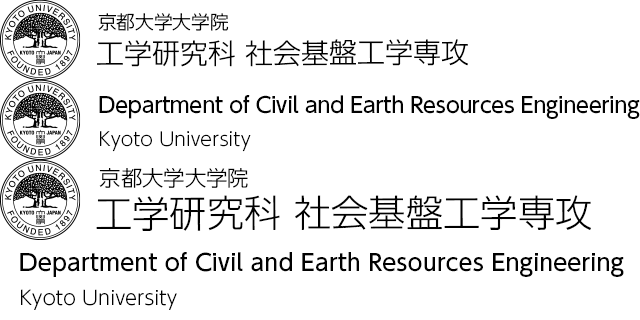Mission
The Department of Civil and Earth Resources Engineering has a threefold mission.
1. Providing solutions using state-of-the-art technologies in engineering science
The Department of Civil and Earth Resources Engineering endeavors to apply engineering science to solve issues related to the construction of a safe, comfortable public infrastructure adapted to the natural environment and suited to an aging society, disaster mitigation, and natural resource and energy development by means of leading-edge technologies. In particular, we seek improvement in the analysis and forecasting capabilities of individual constituent elements from the standpoint of computational and experimental mechanics. We plan to develop a technological paradigm for the comprehensive understanding of the broad natural system, extending from the earth's crust to its atmosphere on the basis of leading-edge technologies, notably computational science.
2. Realization of safe, secure, and satisfying infrastructure development
The department aims to systematically provide a basic scientific elucidation of public infrastructures and their spatiotemporal behavior-from the macroscale structures to the microscale materials, civil engineering structures, and the surrounding geosphere, hydropshere, and atmosphere - and apply the knowledge from the perspective of engineering and disaster mitigation. We invoke knowledge concerning the natural environment, including the global environment, social environment and ecosystems, convey advanced scientific theories and technologies to develop next-generation engineers and researchers who are capable to identify and solve future problems, and to acquire the responsibility for developing innovative technologies.
3. Achievement of sustainable use of the earth resources
Among the constituent parts of the Earth, the crustal part is particularly of importance. The development of theories and technologies concerning geological information of the earth's crust in conjunction with the exploration and development of natural resources and energy, the effective utilization of underground spaces and the design of artificial structures is an urgent task. In particular, exploration technologies using satellite and robotics deployed not only in a global scale, but also in outer space, are called for.
The department provides education using leading-edge measurement and analysis technologies based on computational and experimental mechanics and control theory, and guides engineers and researchers who possess high-level knowledge and autonomous problem-solving skills concerning the scientific elucidation of earth resources.
